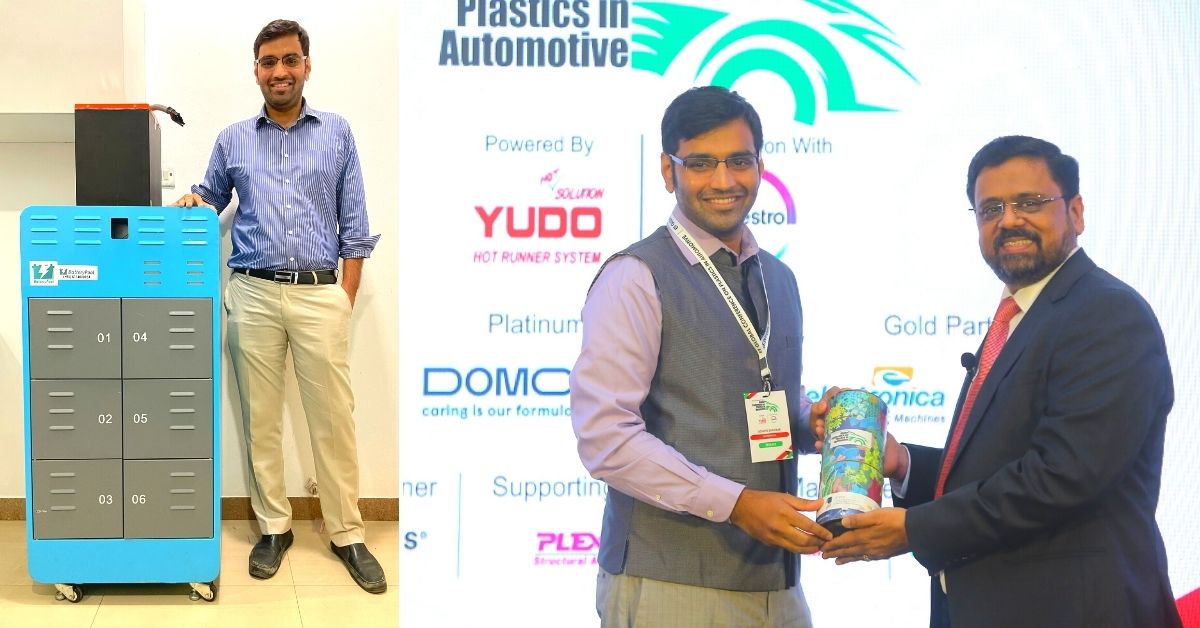Stanford Grad Cuts Time For Charging EV Batteries From 3 Hours to 2 Mins!
BatteryPool, a Pune-based EV startup founded by Stanford graduate Ashwin Shankar, provides IoT-enabled smart swapping stations that swap batteries in just two minutes.

One of the solutions posited for greater adoption of electric vehicles (EVs), which also addresses the paucity of charging infrastructure, is ‘battery swapping’. Unfortunately, not all vehicle manufacturers in this space possess common battery specifications.
BatteryPool, a Pune-based startup incorporated by Stanford University graduate Ashwin Shankar in 2018, is addressing this particular challenge for two and three-wheelers through their internet of things (IoT) based intelligent battery-swapping station for fleets and commercial EVs.
Speaking to The Better India, Ashwin says, “We provide battery agnostic, IoT-enabled smart swapping stations to fleets and original equipment manufacturers (OEMs) who want to run their battery swapping services. Other players do not offer such a tech stack (a combination of technologies a company uses to build and run an application) that is battery agnostic. They either provide their batteries as a service or provide a product with a specific battery standard.”
About the specifications, Ashwin says, “These are typically 48V battery packs that have 1-3 kWh capacity. They provide a range of 40-80 km on a single charge depending on the pack type and EVs in which they are used.” Also, unlike standard charging stations which take on an average three to four hours to fully charge an EV, riders will only need an average of two minutes to swap their used batteries for fresh ones at the BatteryPool battery swapping station.

Entering the EV Domain
Born and raised in Pune to an entrepreneur father and a mother who teaches at a local college, Ashwin did his Bachelor’s in Electrical Engineering from Purdue University in the United States and Master’s in Electrical Engineering from Stanford University.
He moved back to India in 2015, and following his master’s degree from Stanford, worked for a year at the Centre for Technology, Innovation and Economic Research (CTIER), a public policy think tank advising the government on technology policy for the Indian manufacturing industry.
“During my stint at the think tank, I was looking at the tech ecosystem in the automotive space. It was evident that they are headed towards an EV future. It seemed like an interesting space to build a company. From the beginning, we felt that the adoption of EVs in India will happen in the fleet and commercial vehicles due to the low operating expense of these EVs. In this segment, downtime due to charging can mean lost revenue and hence postulated the use of swapping to address the charging requirements of this segment,” he recalls.
While working at the think-tank, he interacted with the Venture Centre, a technology business incubator hosted by CSIR-NCL. Following his interaction there, he subscribed to an email list that put him onto the Entrepreneurs-in-Residence (EIR) programme under the National Initiative for Developing and Harnessing Innovations (NIDHI) programme launched by the Department of Science and Technology (DST). This was a programme launched by the DST for nurturing knowledge-based and technology-driven ideas and innovations into quality startups.
The initial funding for his venture came from the EIR programme, and subsequently, there were other grants which allowed Ashwin and his team to experiment, understand the EV space and how the quickest adoption of this technology will happen for commercial and fleet operations like food delivery apps, ride-hailing apps, taxi and services, amongst others.
Before diving into the venture full time, he wanted to first understand the challenges that fleet operators face. His experiment saw him spend his money on a fleet of 20 two-wheelers, distributing them to delivery professionals and small business establishments in Pune.
Running this fleet for a year, some key bottlenecks were identified including how EV two-wheelers would run out of charge in the middle of deliveries, while drivers were unable to locate charge points when their vehicle needed charging, among others. To address these key challenges, his team began building hardware and software products at the backend.
But there were other concerns as well. One, workers like food delivery professionals couldn’t afford any downtime in their operations, and they are always on the move. Two, for fleet operators there is no standard battery pack since each OEM has their own battery standard. In other words, it didn’t make any sense to present a battery swapping solution where you are forcing a certain kind of battery pack on the end-user. Third, fleet operators have their own applications.
Solutions for Charging
Fleet operators and existing battery swapping operators don’t have to download separate applications, but simply use their existing Application Programming Interface (API) to access the station. What’s particularly novel about these swapping stations is that they are battery-agnostic. Instead of forcing a battery pack on a customer, they work around their battery specification.
As Ashwin, a product of Stanford University, explains further to The Better India, “We build the tech stack (hardware and software) for fleets and operators to deploy and manage a network of swapping stations. These fleets and swapping operators typically have a battery standard that they use in their operations. We build the swapping stack around this battery standard. The electronic and electrical hardware and software in each station is our IP and is standard across all our stations. The mechanical design is typically customised to the battery standard.”
Thus far BatteryPool has more than 80 swapping stations across New Delhi, Pune and Bengaluru. “We provide the swapping stack to operators who deploy and manage a network of these stations. At present, the Delhi-NCR region presents the biggest market for us following the signing of a contract with one of the country’s largest e-rickshaw fleets. We are also about to set shop in Kenya with a large EV company there looking to set up swapping stations,” he adds.
But what is the road ahead?
“We are looking to launch a product for charging non-swappable packs as well that will complement the swapping station offering. These are smart sockets that can monitor energy consumption and can be used to create an ubiquitous network of charging points,” he says.
(Edited by Yoshita Rao)
Like this story? Or have something to share? Write to us: [email protected], or connect with us on Facebook and Twitter.
This story made me
-
97
-
121
-
89
-
167
Tell Us More
We bring stories straight from the heart of India, to inspire millions and create a wave of impact. Our positive movement is growing bigger everyday, and we would love for you to join it.
Please contribute whatever you can, every little penny helps our team in bringing you more stories that support dreams and spread hope.



















